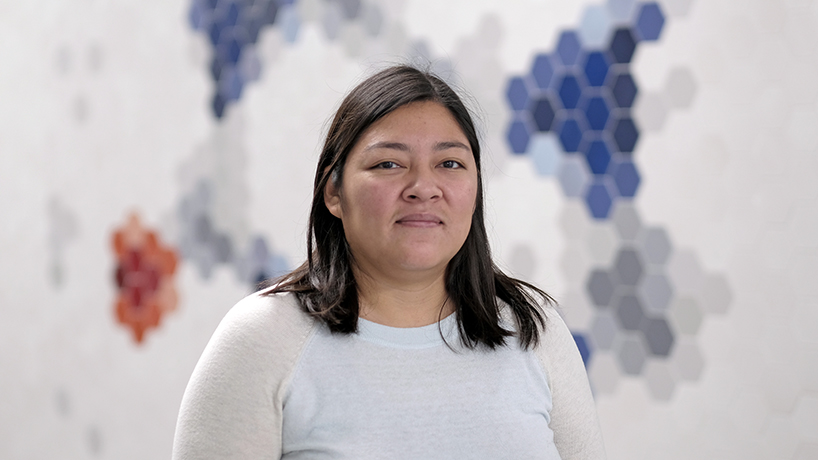
After developing an interest in communications technology while serving with the United States Marine Corps as a Electronic Key Management Systems Supervisor, Joint Undergraduate Engineering student Karla Ramirez will graduate with a BS in electrical engineering on Saturday.
Karla Ramirez joined the United States Marine Corps out of high school in 2005 and spent four years at Marine Corps Base Camp Pendleton in California, deploying twice to Iraq.
Serving, she says, was a calling.
It was that vocation that ultimately put her on path to the University of Missouri–St. Louis.
This December is the culmination of that journey as Ramirez graduates from the UMSL/WUSTL Joint Undergraduate Engineering Program on Saturday with BSN in electrical engineering. She hopes that her skills and experiences developed in the program will illuminate the next step in her course.
It was in the military that Ramirez first developed an interest in communications technology. She spent two years of her deployment working as an Electronic Key Management Systems Supervisor, responsible for all technology involving encrypted communications. She enjoyed the work, so at the end of her enlistment, she decided to stay in the field and went to work for Charter in the St. Louis area.
Ramirez did that for a year and a half and then realized she wanted to make a change.
“I was like, ‘Well, this is what I want to do, but this isn’t where I want to be doing it,’” she recalled. “What’s the next step to get somewhere higher? Electrical engineering was it. I left Charter. I was like, ‘OK, now’s the time to go to school.’”
Ramirez took two years of community college engineering classes and then transferred to UMSL in 2017. She was drawn in by the joint program’s unique structure, which allows students to work during the day and take classes at night. Another plus was the GI Bill, which would completely cover the cost of a public school.
She attended the joint program full time, and took advantage of the evening classes to do an internship at the airport, shadowing the single electrical engineer in the 13-person airport group. The experience taught Ramirez about the day-to-day of an engineer.
“It’s really project management work,” Ramirez said. “It was following him, seeing what’s expected, what they do, how they do it and the system they use. It’s a government entity, so they’ve got to go through three or four steps before anything gets paid out or approved. The engineer doesn’t do the work, but they have to stay on top of the contractors. Every week they have meetings with the contractor: what’s good, what’s done, what’s not done, are you on schedule? What changes may or may not need to be made? It’s interesting, for sure.”
A pair of experiences during her last year have given Ramirez further insight on what life looks like after engineering school: the Boeing Mentorship Program and the Regional Business Council mentorship program.
Her Boeing program mentor was Deborah Fisher, electromagnetic environmental effects (E3) engineer, with whom Ramirez found much in common. A graduate of the joint engineering program, Fisher is also former military. Fisher discussed what to expect in an engineering career and set up different opportunities, such as mock interviews. For the Regional Business Council mentorship program, Ramirez was delighted to be paired with Richard Mark, president and chairman of Ameren Illinois. Though Mark isn’t an engineer, he introduced her to his team.
“It really piques my interest because they’re doing a lot with the Internet of Things,” Ramirez said. “It’s a lot of wireless stuff. They’re going more toward a self-sustaining system where their meters will talk back to their mini hubs, and their mini hubs will talk back to the main hub. If there’s an issue somewhere along that line, they catch it before it becomes really big, so people don’t lose service on a grand scale. If they do lose servers on a grand scale, it automatically tells customers, ‘We know about this outage, we’re fixing it, please be patient.’”
Balancing the increased workload of both programs with her school work was a challenge – she’d applied to both mentorships thinking she’d only get one – but Ramirez made it through while attending school full time.
Now that she’s about to be done, she’s thinking about her next steps and would like to return to military work in a private sector company. She hopes to eventually work in engineering management, but that’s a long-term goal. For now, she’s grateful for the education she received in the joint program.
“It’s a good program,” Ramirez said. “It’s what you make of it.”














